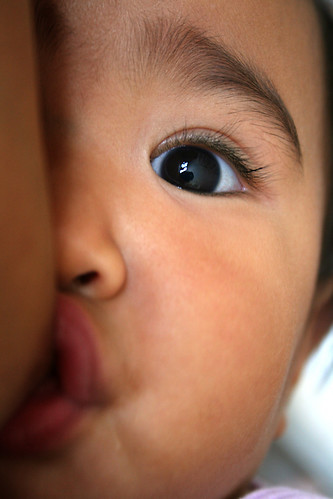“Enjoy the little things in life, for one day you may look back and realize they were the big things.”
— Antonio Smith
Today was a gorgeous, warm spring day, and J. begged to go out back to play after weeks of being cooped up indoors due to lots of rain. I sat nearby and watched as J. (who is now two years and two months old) played in his water table. I was treated to a view of the world through his eyes, as time seemed to slow down, and I found myself noticing and appreciating the smallest details. J. was completely absorbed in the activity of scooping up a cup of a water, pouring it into a funnel, and watching the water stream out the other end. He repeated this sequence of events again and again.
At one point, he picked up a golf ball, and dropped it into the top of the funnel, and then looked at the bottom of the funnel expectantly. When the ball didn’t come out the bottom, he looked over at me with a slightly perplexed expression, and shrugged his shoulders.
He then poured another cup of water into the funnel, and grinned when it came out the bottom of the funnel, but dripping instead of flowing, because the ball was partially blocking the flow of the water.
As he was experimenting like this, a plane flew overhead. Planes are of great interest to J., likely because he ‘s been on one several times to visit his Nanny, and also because his Nanny is coming to visit him again soon, and we’ve been talking with him about her visit. Usually he yells, “Plane! Nanny?”, and waves when he sees one.
‘s been on one several times to visit his Nanny, and also because his Nanny is coming to visit him again soon, and we’ve been talking with him about her visit. Usually he yells, “Plane! Nanny?”, and waves when he sees one.
Today J. looked up, pointed to the plane and said “Plane.” I responded, “Yes, I see the plane too!” He nodded, and went back to scooping and pouring water, with the words, “Plane.One.” A few minutes later, another plane flew overhead. J. again excitedly located and pointed to the plane, shouting, “Plane! Two!” I acknowledged, “Yes there is another plane!”
Well, wouldn’t you know, not five minutes later, another plane passed overhead ? J. couldn’t contain his excitement or delight. His whole body seemed to reach to the sky to point out what to him amounted to the eighth wonder of the world. “Plane! Many!” he declared, at full volume. I smiled a big smile. “Can you believe it, three planes in a row?” Yup, planes, many!
